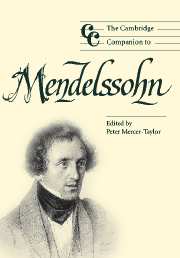Book contents
5 - Mendelssohn as progressive
from Part II - Situating the compositions
Published online by Cambridge University Press: 28 September 2011
Summary
[N]o one loves his predecessors more deeply, more fervently, more respectfully, than the artist who gives us something truly new; for respect is awareness of one’s station and love is a sense of community. Does anyone have to be reminded that Mendelssohn – even he was once new – unearthed Bach, that Schumann discovered Schubert, and that Wagner, with work, word, and deed, awakened the first real understanding of Beethoven?
arnold schoenbergHe [Mendelssohn] is the Mozart of the nineteenth century, the most brilliant musician, the one who most clearly sees through the contradictions of the age and for the first time reconciles them.
robert schumannSchoenberg's appreciation, characteristically as generous as it is backhanded, brings the difficulties inherent in the notion of “Mendelssohn as progressive” into clear focus. On the one hand, it can be difficult to remember that his music was ever in any significant way “new.” “Progressive” more readily conjures up Wagnerian forays into the uncharted realms of the music of the future than the cultivation of the familiar, if daunting, confines of the past. Mendelssohn, however – alone among composers between Beethoven and Brahms – achieved his most characteristic and personal expression in sonata-form works, while, as Charles Rosen has observed, some of his more intimate lyric utterances may “charm, but they neither provoke nor astonish.”
- Type
- Chapter
- Information
- The Cambridge Companion to Mendelssohn , pp. 71 - 88Publisher: Cambridge University PressPrint publication year: 2004
- 1
- Cited by

